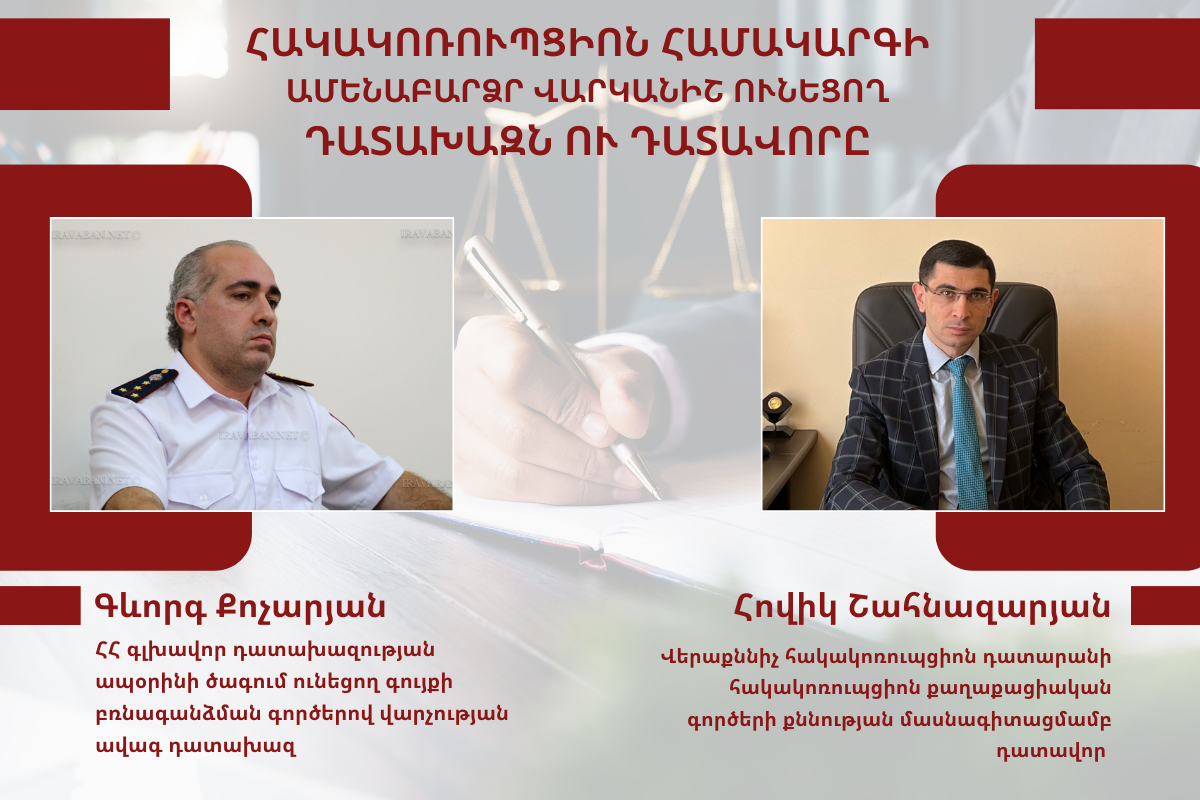At the end of 2024, as the anti-corruption system is showing its first operational results, Iravaban.net online professional media editorial office has initiated a comprehensive analysis of the system’s operation. Given that the media outlet regularly covers court sessions on illicit property confiscation cases, records daily developments in the system, and closely follows all procedural processes, a need has emerged to conduct a professional analysis.
The analysis includes the study of work results from the Anti-corruption Civil Court, Appeal Anti-corruption Court (civil), Cassation Court’s Anti-corruption Chamber (civil), and the General Prosecutor’s Office Department for Illicit Property Confiscation Cases, as well as data from anonymous research conducted among specialists involved in the anti-corruption system.
Analysis Methodology In the second half of December 2024, Iravaban.net sent preliminary written inquiries to the General Prosecutor, and the presidents of the Anti-corruption Court, Appeal Anti-corruption Court, and the Cassation Court’s Anti-corruption Chamber. They were asked to provide information about studies conducted on illicit property confiscation cases, motions filed for claim security measures, lawsuits, their total aggregate value, and settlement agreements reached.
The study included all 13 prosecutors from the General Prosecutor’s Office Department for Illicit Property Confiscation, 5 judges from the Anti-corruption Court, 6 judges from the Appeal Anti-corruption Court, and 5 judges from the Cassation Court’s Anti-corruption Chamber.
The selection of lawyers handling illicit property confiscation cases from the legal community was made from two sources. Iravaban.net formally requested the Chairman of the RA Chamber of Advocates to present lawyers working on illicit property confiscation cases, in response to which data for 9 lawyers representing such cases was provided. Considering that Iravaban.net regularly covers trials of illicit property confiscation cases, invitations to participate in the analysis were also sent to 10 additional lawyers within the media outlet’s radar. As a result, 19 lawyers were involved.
Eight prosecutors, three judges, and twelve lawyers participated in the analysis. Participants were provided with an electronic questionnaire with the option to complete it anonymously. The questionnaire included questions aimed at both evaluating the system’s overall operation and identifying existing issues, as well as criteria for assessing the professional activities of prosecutors and judges.
The ratings were formed in two phases. In the first phase, separate average scores were calculated for the group of judges specialized in anti-corruption civil cases in the anti-corruption judicial system, prosecutors from the Department for Illicit Property Confiscation, and lawyers handling illicit property confiscation cases. In the second phase, the sum of average scores from two groups (judges and lawyers, prosecutors and lawyers) was divided by two to form the final rating score. The voting was conducted under the principle of confidentiality, with participants able to evaluate only those colleagues whose professional activities they had encountered.
General Picture and Results of Illicit Property Confiscation Cases
The General Prosecutor’s Office informed Iravaban.net that since the formation of the Department for Illicit Property Confiscation Cases in September 2020, 553 investigations have been initiated. The competent authority has submitted 201 motions to court regarding claim security measures for 172 persons.
The competent authority has filed 116 lawsuits to court, demanding confiscation in favor of the Republic of Armenia of approximately 1,300 immovable and 251 movable properties, as well as participation in 335 legal entities.
The total aggregate value of the submitted claims amounts to more than 587 billion drams (the total claim amount does not include the market values of participation in legal entities and several other properties).
Within these proceedings, 8 settlement agreements have been signed to date, transferring 7 immovable and 1 movable property to the ownership of the Republic of Armenia, with a total value of approximately 4 billion 100 million drams, as well as about 937 million drams.
According to 4 verdicts issued by the Anti-corruption Court in 2024, after the verdicts enter into legal force, 5 immovable and 2 movable properties, participation in 2 legal entities with a total market value of about 1 billion 123 million drams, as well as about 1 billion 880 million drams will be confiscated in favor of the Republic of Armenia.
The Anti-corruption Court informed Iravaban.net that from January to November 2024, the total number of claims filed for illicit property confiscation cases was 135. As reported by the prosecutor’s office, settlements were reached in 8 cases, 2 of which before court filing. Verdicts were issued in 5 cases, of which 1 rejected the prosecutor’s claim, 3 were partially satisfied, and 1 was fully satisfied.
The Appeal Anti-corruption Court reported that 26 appeals were filed against interim judicial acts in these cases, and 4 against final judicial acts. The court, in turn, issued 27 decisions, of which 7 appeals were satisfied.
Issues of the Illicit Property Confiscation Institution
Prosecutors from the General Prosecutor’s Office Department for Illicit Property Confiscation Cases responded to Iravaban.net‘s inquiry and participated actively. The majority of prosecutors (87.5%) indicated they are extremely overloaded, while 12.5% are overloaded.
When asked what affects the efficiency of proceedings, participating prosecutors responded as follows: nature of the case (50%), level of participants’ preparation (25%), availability of case documents (12.5%), other (12.5%).

According to prosecutors, to conduct proceedings within compressed timeframes, a review of procedural norms is necessary (87.5%). Additionally, they mentioned the need for facility conditions (courtroom) and increasing the judge’s staff.
According to prosecutors, to increase their work efficiency, additional prosecutor positions, support staff increases, legislative changes, and full access to databases (cadastre, road police, etc.) are needed.
Most judges participating in the survey reported having an average workload (66.7%), while 33.3% are overloaded. Most judges believe that the presence and preparation level of trial participants affects trial efficiency.
One of the surveyed judges noted: “…Regarding the availability of documents, if it concerns evidence, their presence or absence doesn’t affect the efficiency of proceedings itself, but may affect the outcome.”
Another judge added: “Actions by defendants aimed at delaying case examinations, which are due to imperfections in procedural norms.”
When asked what conditions are necessary for proceedings to be conducted within compressed timeframes, judges mainly indicated the review of procedural norms and facility conditions.

One judge also noted: “The presence of prepared professional participants, increasing the judge’s staff so that judicial acts can be provided within set compressed timeframes… The proceedings are quite complex in general, therefore it’s necessary to review the proceedings in this regard as well.”
Lawyers also believe that the participants’ level of preparation and case nature greatly affect trial efficiency. Some respondents gave more open answers.
“In reality, several circumstances will have a significant impact on efficiency: a) the prosecutor’s office being more familiar with civil procedure processes and understanding the institutions, b) increasing court independence (including broad discussion and coordination of training course programs [content]), c) full application of civil code and civil procedure regulations by anti-corruption court judges (rather than artificial interpretations attempting to cover up prosecution shortcomings and political authority ‘wishes’), d) clarification of the legislative base (at least clarify, separate and establish grounds for various procedures provided by law on illicit property confiscation /in case of presumed criminal – connection with crime, and in cases unrelated to criminal – connection with declarations, etc.)” – they noted.
Another lawyer noted that trial efficiency is affected by parties’ preparation, court’s avoidance of convention norm violations, particularly from the perspective of fair trial rights and “equality of arms” principle, and proper rather than selective fulfillment of all obligations imposed by RA legislation on the prosecutor’s office during the pre-trial investigation phase.
Another lawyer noted that efficiency is mainly affected by lack of trust.
When asked what conditions are necessary for proceedings to be conducted within compressed timeframes, lawyers gave the following responses.

Lawyers also presented clarifications of their responses. For example, one noted: “If court independence is ensured, a significant portion of cases will conclude within compressed timeframes (simply by rejecting claims). To remove significant ‘political pressure’ on courts to mandatorily confiscate or at least ‘assist the prosecution’, it’s necessary to: a) review legislation and clarify prosecution action limits (for example, regarding statute of limitations, significance of calculation differences, etc.), b) separate confiscation cases (different procedure for presumed criminal cases, different procedure and prerequisites for cases presumably unrelated to crime), etc., c) regulate legal grounds (grounds are not described in civil code and law, and most cases are general), d) it’s essential that individuals knowledgeable in procedural norms be involved on the plaintiff’s side.”
Another lawyer pointed out the specificity of presented requirements.
According to lawyers, to increase prosecutors’ work efficiency, professional independence is necessary (58.3%), 16.7% responded that training and support staff increases are needed, while 8.3% believe legislative changes are necessary.
Lawyers also noted about professionalism: “The prosecution needs to have deep knowledge and understanding of constitutional law, civil law, and civil procedure, which will increase its effectiveness.”
Representatives of all 3 surveyed groups agree that trial efficiency is mainly affected by participants’ preparation and case nature.
Additionally, when asked what’s needed to conduct proceedings within compressed timeframes, procedural norm revision was mentioned, with judges and prosecutors noting facility improvement needs, and lawyers emphasizing the importance of prepared professional specialists.
Analysis of Anti-corruption System Prosecutors’ and Judges’ Ratings
This section of the analysis aimed to reveal the professional ratings of key players in the anti-corruption institutional system – prosecutors and judges handling illicit property confiscation cases. The research is notable as ratings were given from within the system by professionals interacting with each other.
Eight prosecutors, five judges, and eleven lawyers participated in this section of the analysis conducted by Iravaban.net.
Top 5 Prosecutors with Highest Ratings
The prosecutors’ top five is led by department senior prosecutor Gevorg Kocharyan with 8.89 points. His rating is notable as it’s based on the largest number of professional opinions – 14 (11 lawyers and 3 judges). Second place is prosecutor Hamlet Harutyunyan with 8.65 points from eight evaluators (five lawyers and three judges). Third place is Nelli Ter-Torosyan with 8.52 points from nine evaluators (six lawyers and three judges). Fourth place is Artashes Harutyunyan with 8.50 points, also from nine evaluators (six lawyers and three judges), and the top five concludes with Ruzanna Khudaverdyan with 8.35 points from eight evaluators (five lawyers and three judges).
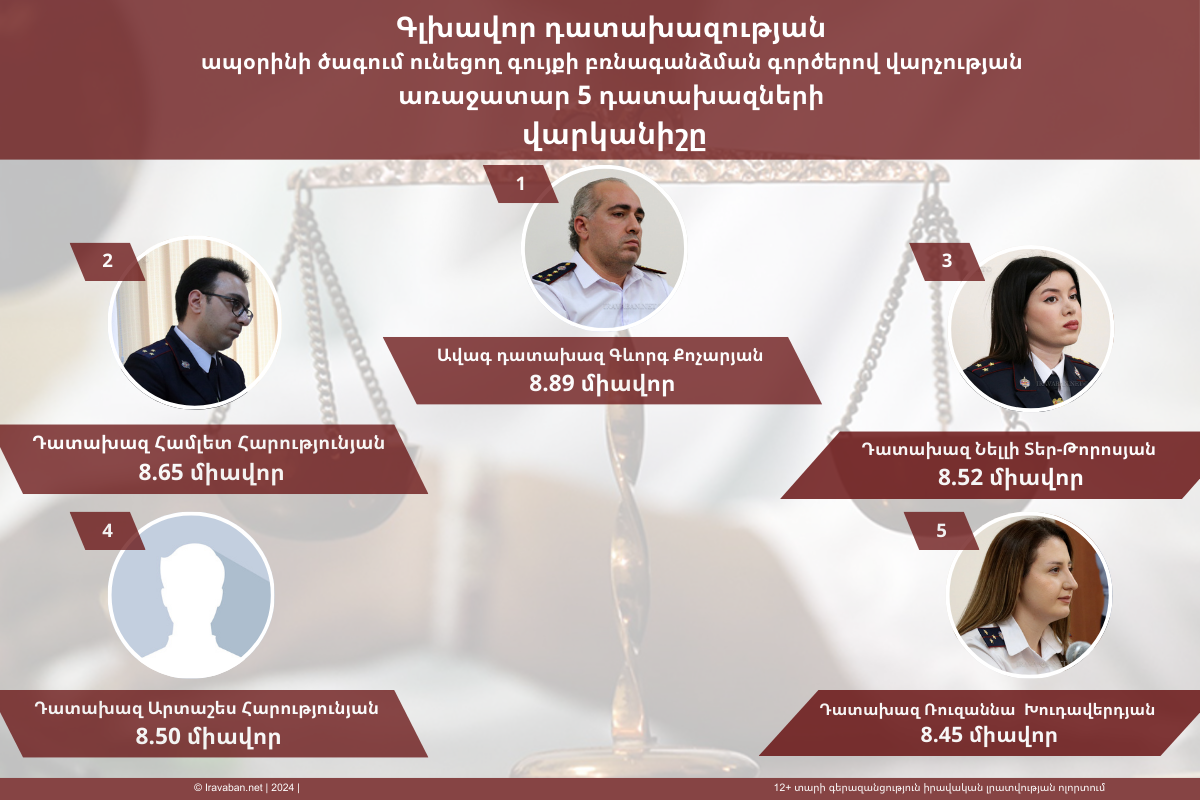
Top 5 Judges with Highest Ratings
Representatives of the Appeal and Cassation Courts occupied leading positions in the judges’ top five. In first place is Appeal Anti-corruption Court judge Hovik Shahnazaryan with 9.19 points. His rating is based on the opinion of 12 professionals – six lawyers and six prosecutors. In second place is Cassation Court judge Liparit Melikjanyan with 8.91 points, evaluated by four lawyers and four prosecutors. In third place is Appeal Court judge Hayarpi Zargaryan with 8.88 points, also with 12 evaluators (six lawyers and six prosecutors). Fourth place is held by Cassation Court judge Arman Kurekhyan with 8.81 points from eight evaluators (four lawyers and four prosecutors), and the top five concludes with Cassation Court judge Gevorg Gyozalyan with 8.67 points from seven evaluators (four lawyers and three prosecutors).
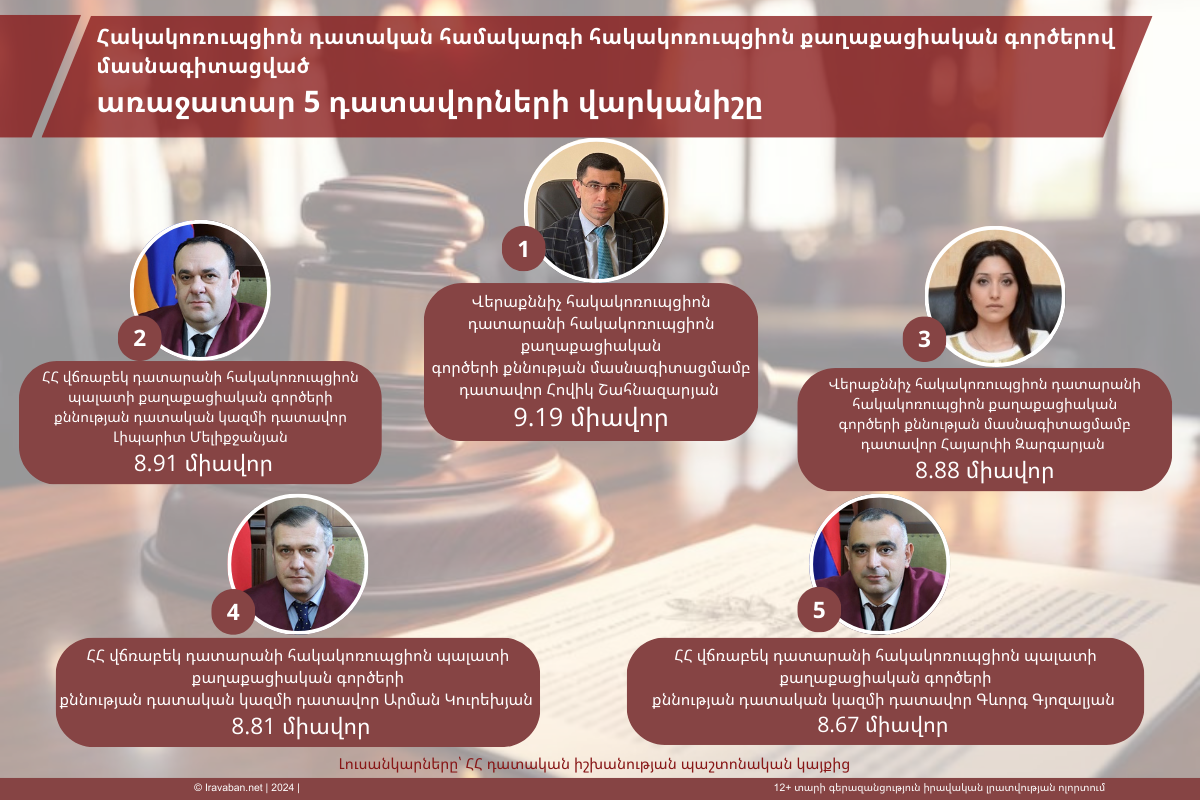
Interesting Trends
For prosecutors, it’s important that all evaluated prosecutors participated in court sessions on illicit property confiscation cases, which allowed both judges and lawyers to form clear opinions about their professional capabilities.
Notable is the case of senior prosecutor Gevorg Kocharyan from the Department for Illicit Property Confiscation. His 8.89 points is not only the highest among prosecutors but also has the highest degree of credibility among all evaluated prosecutors and judges. This conclusion is based on the fact that the rating was formed from the opinions of the largest number of professionals – 14, of which 11 are lawyers and 3 are judges.
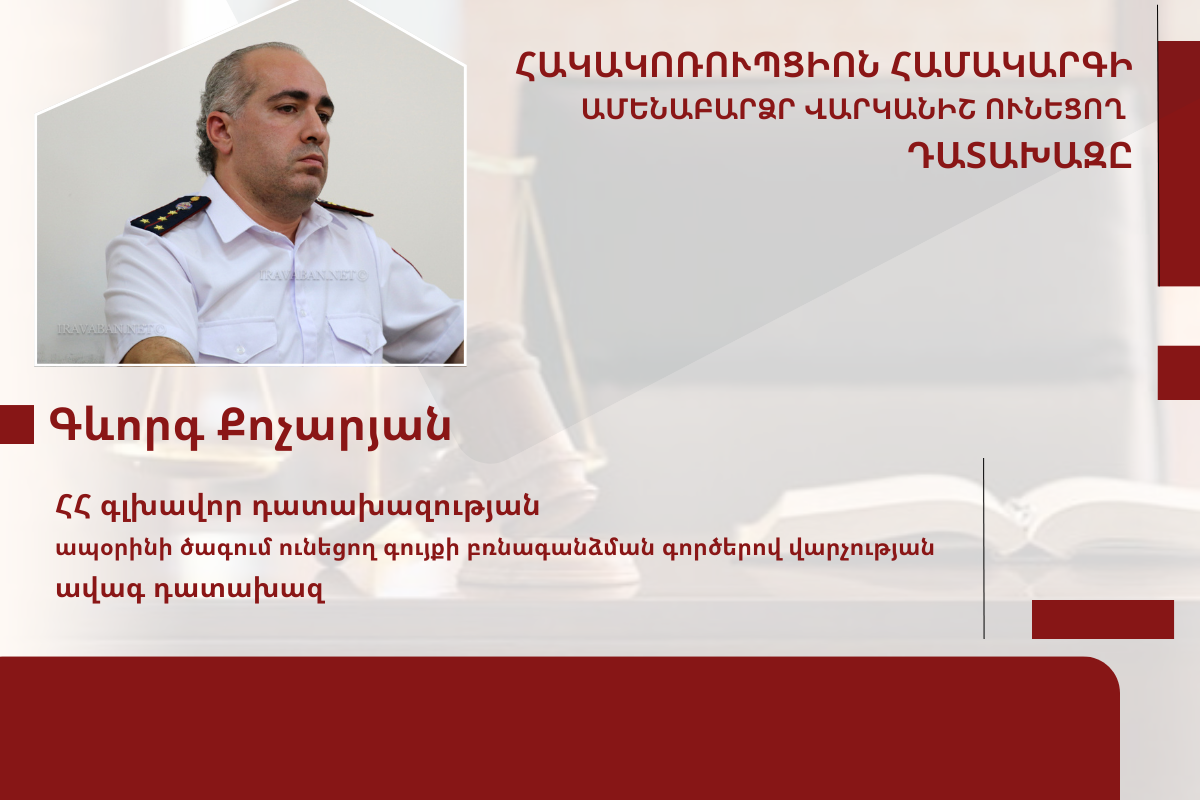
It’s remarkable that although there are not yet any illicit property confiscation cases being examined on merits in the Anti-corruption Chamber of the Cassation Court, three judges from this instance appeared in the top five with high ratings. This probably testifies to their professional authority and previous experience. At the same time, the high ratings of Appeal Anti-corruption Court judges are combined with evaluations from a larger number of professionals, which might also be due to their professional and scientific-analytical activities in this field.
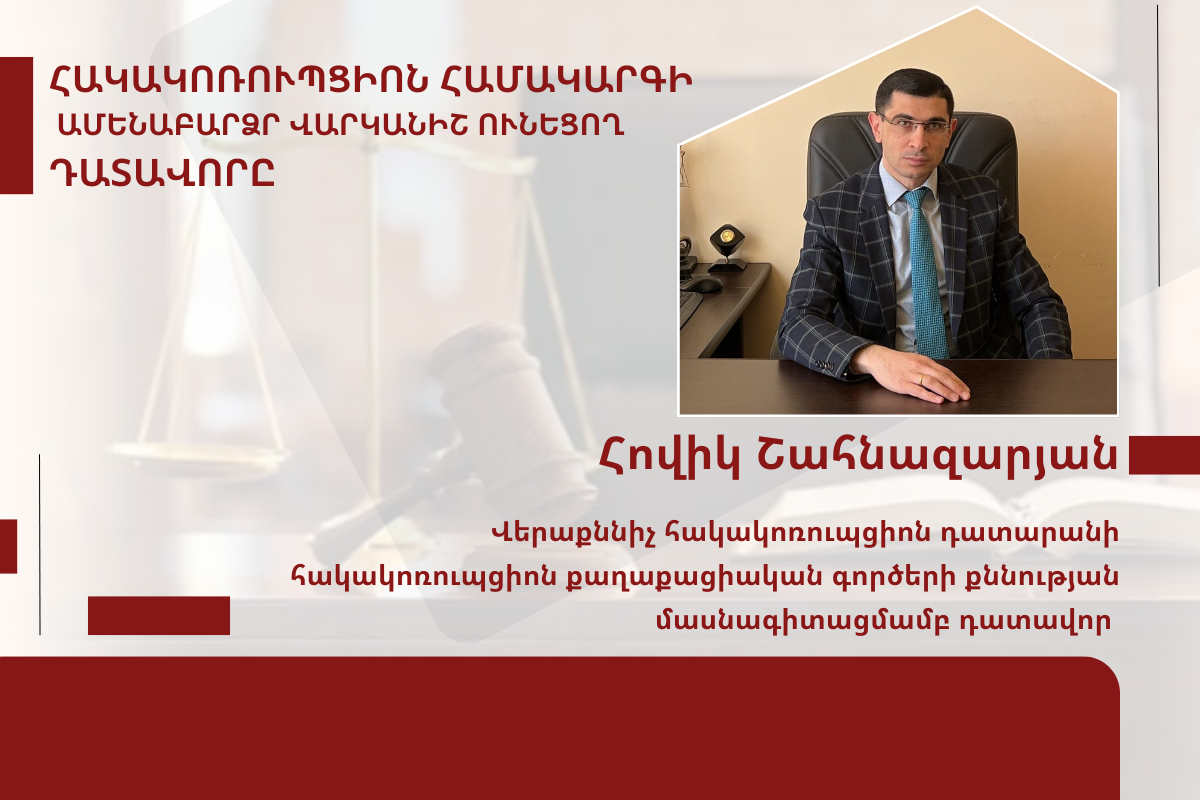
Summary
The analysis conducted by Iravaban.net has revealed a multi-layered picture of the illicit property confiscation institution’s activities in 2024. The first significant results have been recorded in the field – 553 investigations have been conducted, 116 claims with a total value of 587 billion drams have been submitted, 8 settlement agreements worth about 5 billion drams have been signed, and the first verdicts have been issued. Among the challenges facing the system, the need to revise procedural norms and legislation, develop professional capabilities, and resolve infrastructural issues are key.
It is noteworthy that in the newly created anti-corruption system, a culture of professional mutual evaluation has already formed, as evidenced by the high rating indicators of both prosecutors and judges. It is also remarkable that representatives of all system components – prosecutors, judges, and lawyers – agree that increasing participant preparation levels and improving the legislative framework are priorities for increasing trial effectiveness.
In this context, the December 20, 2024 statement of the CSOs Anti-Corruption Coalition of Armenia’s Management Board is significant, where on one hand, the government’s activities in applying the illicit property confiscation institution were highly evaluated, and on the other hand, concern was expressed about delays in improving the institution. Particularly concerning is the fact that despite the Venice Commission’s advisory opinion of December 19, 2022, the RA Constitutional Court has inexplicably suspended proceedings on the constitutionality of the “Law on Confiscation of Illicit Property” and has not yet made a final decision. This legal uncertainty contains significant risks, as anti-corruption courts continue to examine and make decisions on such cases without the Constitutional Court’s final resolution on the law’s constitutionality.

